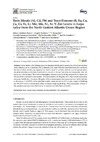Please use this identifier to cite or link to this item:
https://accedacris.ulpgc.es/jspui/handle/10553/74863
| Title: | Toxic metals (Al, cd, pb) and trace element (b, ba, co, cu, cr, fe, li, mn, mo, ni, sr, v, zn) levels in sarpa salpa from the north-eastern atlantic ocean region | Authors: | Gutiérrez-Ravelo, Alberto Gutiérrez, Ángel J. Paz, Soraya Carrascosa Iruzubieta, Conrado Javier González-Weller, Dailos Caballero, José M. Revert, Consuelo Rubio, Carmen Hardisson, Arturo |
UNESCO Clasification: | 3105 Peces y fauna silvestre 3214 Toxicología |
Keywords: | Marine Pollution Risk Assessment Toxic Metals Trace Elements |
Issue Date: | 2020 | Journal: | International Journal of Environmental Research and Public Health | Abstract: | Sarpa salpa is a fish belonging to the Sparidae family and is usually found in local markets. Toxic metals such as aluminum (Al), cadmium (Cd), lead (Pb) and trace elements such as boron (B), barium (Ba), cobalt (Co), copper (Cu), chromium (Cr), iron (Fe), lithium (Li), manganese (Mn), molybdenum (Mo), nickel (Ni), strontium (Sr), vanadium (V) and zinc (Zn) are incorporated into fish tissues and remain there. The liver has the highest concentrations of all the analyzed toxic metals and almost all the analyzed trace elements. The consumption of 100 g/day of S. salpa muscle tissue does not pose a health risk. However, 100 g/day of liver consumption may pose a serious health risk due to the intake of Cd (572% of the tolerable weekly intake for adults with a body weight of 68.48 kg) and Pb (117% of the tolerable daily intake for adults weighing 68.48 kg). The consumption of liver of this species is not recommended due to its possible harmful effects on health. | URI: | https://accedacris.ulpgc.es/handle/10553/74863 | ISSN: | 1661-7827 | DOI: | 10.3390/ijerph17197212 | Source: | International Journal of Environmental Research and Public Health [ISSN 1661-7827], v. 17 (19), p. 1-12, (Octubre 2020) |
| Appears in Collections: | Artículos |
SCOPUSTM
Citations
16
checked on Jun 8, 2025
WEB OF SCIENCETM
Citations
19
checked on Mar 1, 2026
Page view(s)
257
checked on Jan 15, 2026
Download(s)
271
checked on Jan 15, 2026
Google ScholarTM
Check
Altmetric
Share
Export metadata
Items in accedaCRIS are protected by copyright, with all rights reserved, unless otherwise indicated.
